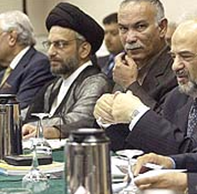

Members of Iraq's Governing Council are close to completing a transitional constitution that would make Islam a basis, but not the only one, for Iraqi laws, an Iraqi legal expert says.
The document also would temporarily allow the country's Kurdish minority to continue to run its own affairs in northern Iraq as it has done for 13 years.
The council hopes to have a transitional administrative law this month, ahead of a Feb. 28 deadline set by U.S. officials and the council in November, Feisal Istrabadi said in a telephone interview Monday from Baghdad. Istrabadi is an Iraqi-American lawyer who is advising Adnan Pachachi, this month's president of the U.S.-appointed council.
Agreeing to a transitional law may be the easiest task Iraqis complete before a July 1 deadline for transferring power from the U.S.-led coalition provisional authority to Iraqis. The next step is formation of a transitional national assembly. The November plan calls for caucuses to be held in Iraq's 18 provinces to choose representatives to the assembly by the end of May. But there are concerns about how many Iraqis will participate in part because of continuing violence.
Istrabadi said a six-page draft of the provisional constitution circulating among the 24 council members calls for the new Iraq to be a "pluralistic, federal, parliamentary democracy." It would establish separation of powers between different branches of government and the principle of judicial review.
Other key elements:
•Islam. Iraqi legislators would not be obliged to ban banks from charging interest or to enact strict punishments such as cutting off hands for theft or stoning for adultery, as both required under strict Islamic law or sharia. Laws would be based on Western and Muslim sources. By making a general reference to Islam, Iraq's majority Shiite Muslims and minority Sunnis could follow their own traditions on family law including divorce, child custody and inheritance. Freedom of religious practice for non-Muslims and equal rights for women would be guaranteed.
•Kurds. Istrabadi confirmed a report in Monday's New York Times that Kurds would continue to govern themselves as they have since the 1991 Gulf War, when U.S. and British planes began patrolling a northern no-fly zone to prevent attacks by the former regime.
Istrabadi added that a request to make Kurdish an official language in addition to Arabic was unlikely to be granted.
Continuing Kurdish autonomy could antagonize neighboring Turkey, which has its own restive Kurdish population. A semi-independent north also could annoy Iraq's once dominant Sunni minority, which hopes to retain some of its former power in a future Iraqi central government.
Monday, State Department deputy spokesman Adam Ereli reaffirmed U.S. support for a "unified Iraq." But he said the structure of a future state is "for the Iraqis to decide."
U.S. officials say Kurds and Iraqi exiles who dominate the Governing Council are still the main political actors in Iraq because other Iraqis are afraid to come forward and risk becoming targets of insurgents. They say it is possible that the deadline for transferring power could slip a few months if necessary. Even after the transfer, more than 100,000 U.S. troops are likely to remain in the country for at least another year along with thousands of U.S. diplomats, aid workers and private contractors.
Another major issue is whether the procedure to choose a transition assembly will satisfy Grand Ayatollah Ali al-Sistani, Iraq's leading Shiite cleric. He issued a fatwa or Islamic ruling last summer that members of the assembly must be elected. The Bush administration is concerned that direct elections might produce a Shiite religious government; Shiites are 60% of the 24 million population and hard-line religious groups are better organized than secular ones.
Sistani has refused to meet Paul Bremer, the U.S. administrator in Iraq, or other U.S. officials. Istrabadi said Pachachi hoped to see Sistani this week. The cleric met with U.N. representative Sergio de Mello last summer before he died in an August bombing in Baghdad.
Pachachi and other members of the Governing Council are due to meet with U.N. Secretary General Kofi Annan in New York on Jan. 19 to urge a bigger U.N. role in Iraq's political transition. Annan named New Zealander Ross Mountain, a veteran U.N. relief expert, as de Mello's interim replacement. Mountain is based in Cyprus. A U.S. official said Washington would like a permanent U.N. envoy with more political experience.



















